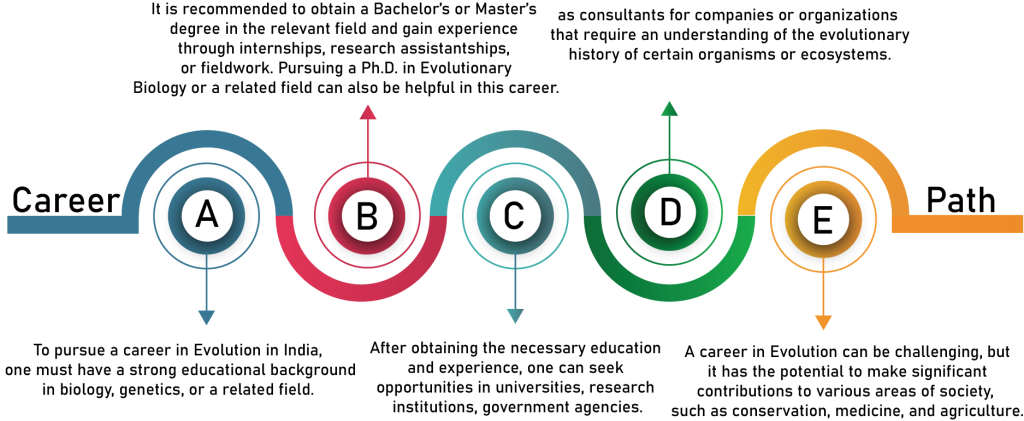Evolution is the scientific study of how living organisms have changed and diversified over time. It involves analyzing the genetic and physical characteristics of living organisms to understand their origins and evolutionary history. Evolution is an important field of study that helps us to understand how life on earth has evolved, and how we can use this knowledge to improve our lives.
If you’re interested in pursuing a career in evolution in India, here are some details that you should know about this field.

Work description
Evolutionary biologists typically conduct research to understand the origins and evolutionary history of living organisms.
They may analyze genetic data, study the physical characteristics of organisms, or observe behavior to understand how organisms have adapted to their environments over time.
Evolutionary biologists may work in universities, research institutions, or government agencies.
They may also work as consultants for companies or organizations that need to understand the evolutionary history of certain organisms or ecosystems.
Travel opportunities
Evolutionary biologists have the opportunity to travel to different parts of the world to conduct research and collect data.
Opportunities for discovery
Evolution provides opportunities for researchers to make groundbreaking discoveries and uncover new insights about the natural world.
Interdisciplinary nature
Evolutionary research often involves collaboration with researchers from a variety of fields, such as genetics, ecology, and anthropology, providing opportunities for interdisciplinary learning and the development of new research techniques.
Career diversity
Graduates with a degree in Evolution can pursue a wide range of careers, including academic research, industry research and development, science education, science journalism, and science policy.
Impactful work
Evolutionary research has a significant impact on our understanding of the natural world, contributing to advancements in fields such as medicine, conservation, and agriculture.
Personal fulfillment
A career in Evolution can be personally fulfilling, as it allows individuals to pursue their passions and interests in understanding the history of life and the natural world.
High stress
Like many scientific fields, evolution can be highly competitive and require years of education and training.
Long hours
Evolutionary biologists may need to work long hours, especially when conducting fieldwork or experiments.
Competitive field
Funding for research in evolutionary biology can be limited, which can make it difficult to secure funding for research projects.
Constant learning
The work can be emotionally challenging, especially when studying the impact of environmental changes on endangered species.
The cost of pursuing a career in Evolution in India can vary depending on various factors such as the level of education, the institution, and the location. Here are some estimates of the expenses involved in pursuing a career in Evolution in India:
- Bachelor’s Degree: Pursuing a Bachelor’s degree in Evolutionary Biology in India can cost anywhere between INR 50,000 to INR 2,00,000 per year, depending on the institution.
- Master’s Degree: Pursuing a Master’s degree in Evolutionary Biology in India can cost between INR 1,00,000 to INR 3,00,000 per year, depending on the institution.
- Ph.D.: Pursuing a Ph.D. in Evolutionary Biology in India can cost between INR 50,000 to INR 3,00,000 per year, depending on the institution.
- Research Expenses: Depending on the research project, expenses can vary significantly. This can include equipment, materials, fieldwork expenses, and travel costs. It is difficult to estimate the exact cost of research expenses as they can vary significantly depending on the project.
[wpcharts type=”horizontalbarchart” bgcolor=”red:gray:yellow,blue:gray:yellow,random:gray:yellow,purple:gray:yellow” min=”0″ legend=”true” titles=”2 year , 5 year” values=”3,7,5,12″]
The earning potential for evolutionary biologists in India can vary depending on their level of education and experience.
According to Payscale, the average salary for an evolutionary biologist in India is around Rs. 500,000 per year.
However, salaries can range from Rs. 250,000 to over Rs. 1,500,000 per year depending on the position and level of expertise.
[wpcharts type=”horizontalbarchart” bgcolor=”red:gray:yellow,blue:gray:yellow,random:gray:yellow,purple:gray:yellow” min=”0″ legend=”false” titles=”Entry-Level, Mid-Career, Senior-Level ” values=”5,15,25,35,45,55″]
Strong interest in biological sciences, including genetics, ecology, and natural history.
Critical thinking skills and an analytical mindset.
Ability to think creatively and develop novel hypotheses.
Strong problem-solving skills, including the ability to design experiments and interpret data.
Comfort with complex quantitative analyses, such as statistical modeling and bioinformatics.
Ability to communicate scientific findings effectively, both verbally and in writing.
Patience and persistence in conducting long-term research projects.
Lack of interest in the biological sciences and disinterest in understanding natural processes.
Inability to think critically and analyze scientific data.
Poor problem-solving skills and difficulty in designing experiments.
Difficulty in understanding and interpreting complex quantitative analyses, such as statistical modeling and bioinformatics.
Ineffective communication skills, both verbally and in writing.
Impatience and a lack of persistence.
Difficulty in working independently or collaboratively with other scientists.
Work-life balance
Work-life balance in evolutionary biology can vary depending on the specific position and employer.
Fieldwork can be physically demanding and require long hours, but it may also provide opportunities for travel and adventure.
Research positions in universities or government agencies may offer more regular hours and a better work-life balance.
Like many scientific fields, however, evolutionary biology can require a significant time commitment, especially when conducting research or experiments.

Evolutionary biology has the potential to impact many different areas of society, including medicine, conservation, and agriculture.
Understanding the evolutionary history of organisms can lead to better conservation efforts and protect endangered species.
Evolutionary biology can also inform medical research, helping to develop new treatments and cures for diseases.
The study of evolution can also inform agriculture and food production, leading to more sustainable practices and better food security.
This field can lead to a better understanding of how to conserve and protect endangered species and ecosystems.
Evolutionary biology can also inform medical research, helping to develop new treatments and cures for diseases.
Evolutionary genetics
studying the genetic basis of evolutionary change.
Evolutionary ecology
studying how natural selection, adaptation, and other evolutionary processes shape ecological interactions.
Evolutionary developmental biology
studying the genetic and molecular mechanisms underlying the evolution of developmental processes and patterns.
Paleontology
studying the fossil record to understand the history of life and evolutionary transitions.
Behavioral ecology
studying how animal behavior has evolved through natural selection and other evolutionary mechanisms.
Conclusion:
In conclusion, a career in evolution can be a challenging but rewarding path for those interested in understanding the origins and history of life on earth. With the right education and experience, evolutionary biologists can make important contributions to many different areas of society, from conservation to discoveries. A career in Evolution can provide opportunities for personal and professional growth, impactful work, and diverse career options.



